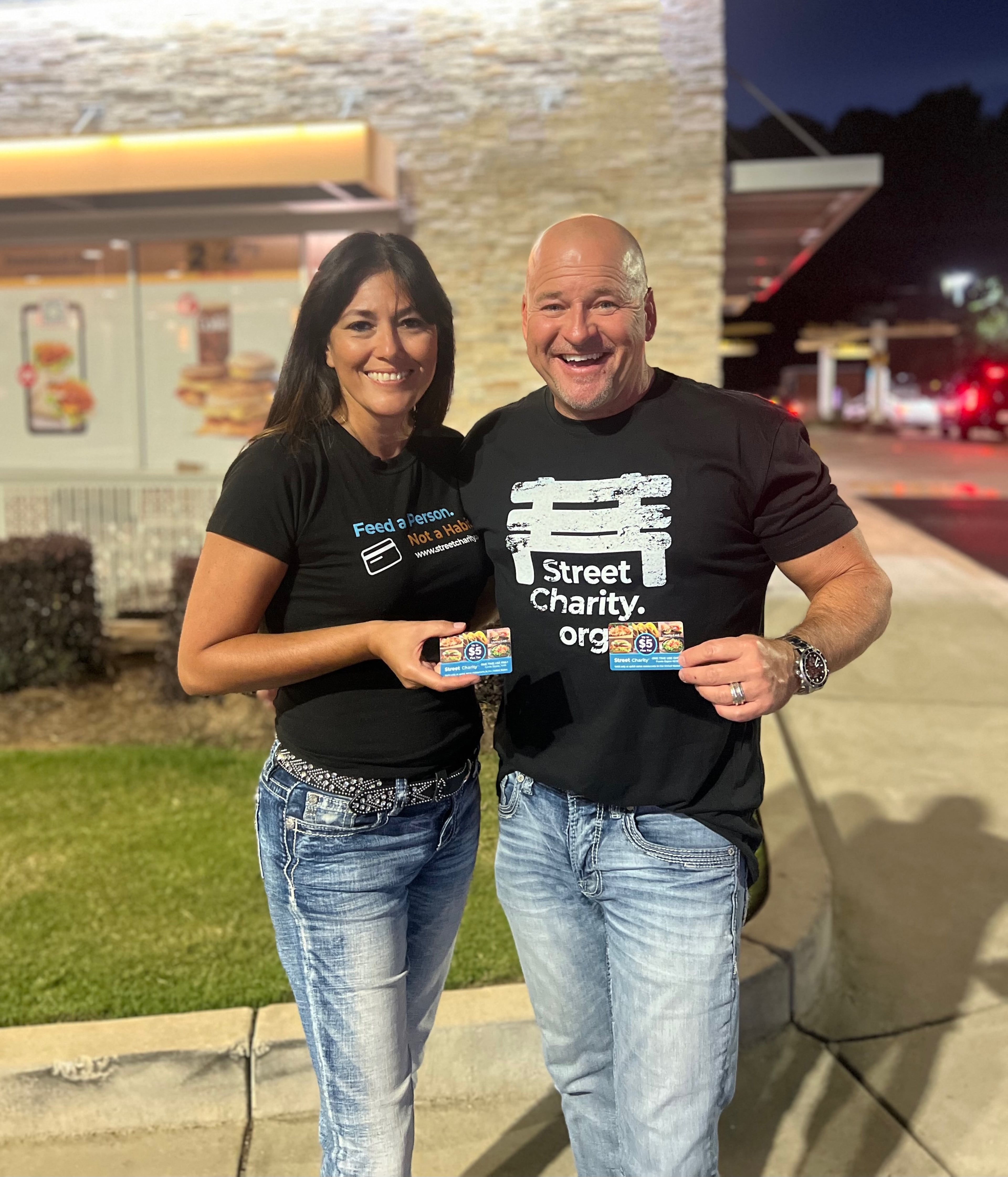Atlanta couple launches nonprofit to fight hunger one $5 card at a time

Driving home every night through Buford Highway and Cheshire Bridge, John and Antuanette Patton couldn’t help but notice what many Atlantans wish to avoid: homeless people.
“When we moved to Atlanta, we had been helping the homeless and feeding the hungry in every imaginable way,” John Patton said. “From working in soup kitchens, making sandwiches, to taking people out to lunch and dinner.”
But on those drives, they knew that handing out a couple of dollar bills on a street corner wasn’t enough.
Too often, they wondered if the money was being used for food.

“We knew that giving out dollar bills on the street was not the answer,” said John Patton, who has worked in public health for 15 years, focusing on preventing chronic diseases like cancer and diabetes. “We didn’t like the feeling of having to make a judgment call right there on the spot: ‘How are they going to use this money? Are they hungry or not? Are they going to use the money for drugs or alcohol?’ We just felt horrible.”
The Atlanta couple’s solution was to bring dignity and choice into the equation.
So, in 2021 they started Street Charity, a nonprofit that uses the power of technology and the reach of quick-service restaurants to provide meals to people in need.
Donors buy $5 prepaid meal cards, usable at thousands of fast-food and quick-service restaurants nationwide wherever Discover cards are accepted.
With the cards, recipients can walk into McDonald’s, Zaxby’s, Chick-fil-A, Starbucks, and dozens of other chains, and order what they want, when they want.
If the cardholder doesn’t spend the entire $5, or if the card isn’t used at all after six months, the balance reverts to a local food bank.
While the Patton’s acknowledge that $5 is not a lot of money, it is also likely more than someone would hand someone in cash or change.
“When you hand out a card,” Patton said, “you know that it is guaranteed that somebody is going to eat.”
Patton said it took him and his wife four years to get the project off the ground, especially convincing a fintech company — in this case Discover Global Network — to back it.
It has since grown to several states and on Thursday, the couple will officially launch the program at a press conference in downtown Atlanta.
Atlanta’s homeless problem has been rampant and consistent for years.
In a study conducted in January and February, Partners for Home, the nonprofit agency that implements the city of Atlanta’s homeless strategy, reported that the city’s homeless population stood at 2,894, with 1,061 unsheltered — a slight increase over last year.
Earlier this year, the city faced sharp criticism after a construction vehicle crushed and killed Cornelius Taylor while he was inside his tent at the Old Wheat Street encampment.
After Taylor’s death, Mayor Andre Dickens convened a Homelessness Task Force to prevent similar tragedies, make clearings safer, and improve the city’s homeless strategy.

In June, The Atlanta Journal-Constitution first reported on Partners for Home’s ambitious plan to house 400 unsheltered people and end homelessness in the downtown area ahead of next year’s FIFA World Cup.
For his part, Patton said over the last six months, more than 10,000 cards have been distributed in Georgia, Kentucky, Texas, Florida, New York, Pennsylvania and Alaska.
“Our vision is a card in every purse, a card in every wallet,” Patton said.
Organizations like churches, civic clubs, and schools are taking notice.
Patton said a Title One elementary school in Cobb County recently received cards for students, and the Georgia State University Panther Pantry picked up 200 cards to help students dealing with food insecurity.
“They give out bags of food to the students, but the students want to hang out with their friends. They want to go to Chick-fil-A and McDonald’s. Now they can,” Patton said. “It provides comfort, whether you’re absolutely starving or you just don’t have any food in your belly.”

For Antuanette Patton, a graphic designer for a large health insurance broker, the model also solves another problem: Everyday people want to help but often don’t feel equipped to do so.
“People don’t carry cash like they used to, and even when they do, they are afraid it will not be used for food,” she said. “Now they have a foolproof way to help.”
The Atlanta-based Street Charity also encourages donors to become part of the process by distributing the cards themselves.
Monthly donors can receive cards to hand out in their communities, creating face-to-face opportunities to connect with people who are too often overlooked.
“This idea was born out of a desire to give dignity and respect to people, to allow them to go from begging at the back door of a fast-food restaurant to walking in the front door as a patron and deciding what they want to eat, when they want to eat, and where they want to eat,” John Patton said. “With a big side-serving of dignity.”
